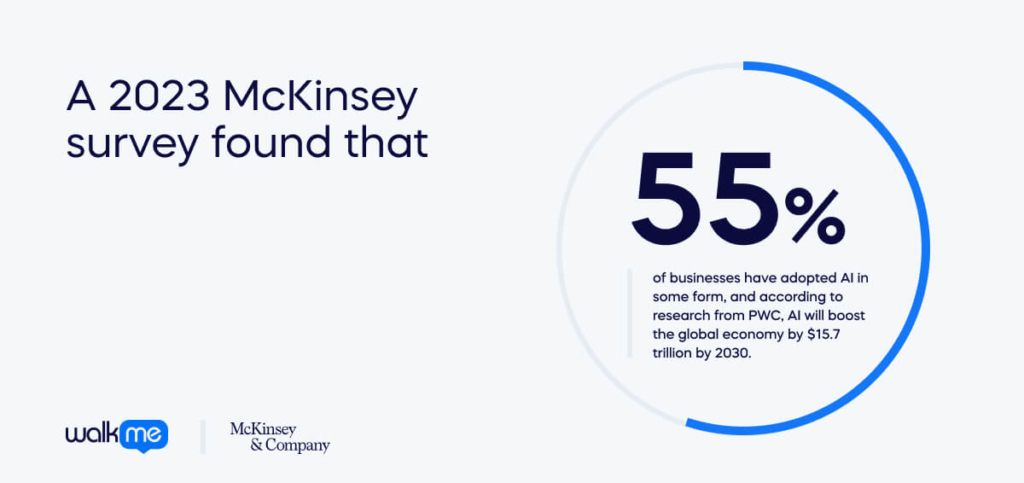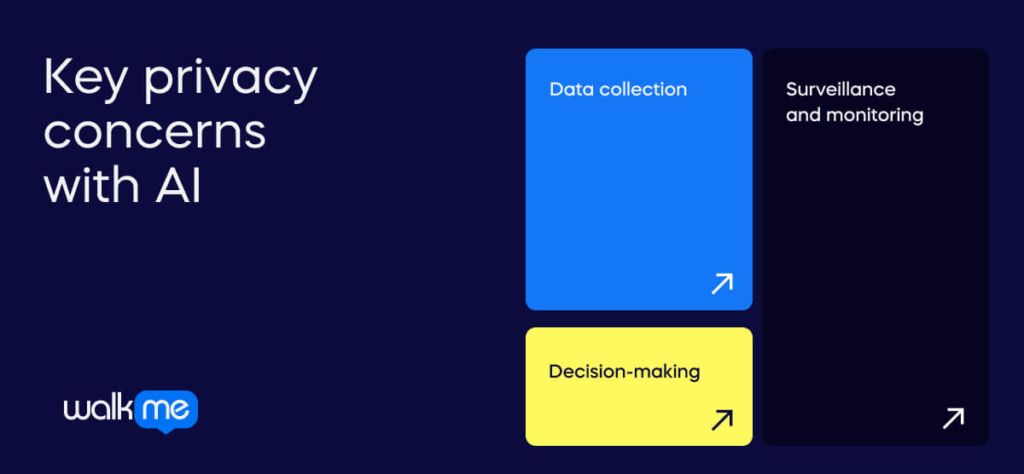From streamlining operations to enhancing customer experiences, artificial intelligence (AI) is reshaping the business landscape.

A 2023 McKinsey survey found that 55% of businesses have adopted AI in some form, and according to research from PWC, AI will boost the global economy by $15.7 trillion by 2030.
Furthermore, Forrester Analyst Rowan Curran predicts that 10% of employees will use generative AI in 2023. And a 2023 Gartner survey found that 42% of HR leaders expected entry-level positions to be significantly impacted by AI.
There’s no doubt that we’re living through the AI revolution.
However, this technological revolution brings with it a critical concern: privacy.
AI’s ability to collect, analyze, and act on vast amounts of data raises significant privacy issues, impacting your business and customers. This is one of the top challenges facing the AI adoption movement.
This article will explore the multifaceted privacy concerns associated with AI in the workplace, delve into how these concerns manifest in different business contexts, and examine the balance you must strike between leveraging AI for business growth and safeguarding personal privacy.
You’ll learn practical solutions and strategies to tackle privacy challenges, helping your business succeed in AI while maintaining trust with customers and stakeholders.
Understanding AI and privacy
At its core, AI involves creating algorithms capable of processing large data sets, learning from them, and making decisions or predictions based on this learning. This technology powers everything from customer service chatbots to sophisticated market analysis tools.
AI has proven to be a highly promising trend, boasting a plethora of potential use cases.
Privacy has taken on a new dimension in our modern and digital age. It’s no longer just about keeping personal information confidential; it’s about controlling and understanding how it is collected, used, and shared.
Respecting and protecting this aspect of privacy is crucial for maintaining customer trust and complying with increasingly stringent regulations as regulatory bodies scramble to catch up.
The intersection of AI and privacy
The intersection of AI and privacy is where things get complex. AI systems, by their nature, require access to vast amounts of data to learn and improve.
This data often includes personal customer information – from shopping habits to personal preferences.
As such, AI poses unique challenges in balancing the innovative use of data with the ethical and legal implications of privacy protection.
Navigating this intersection means understanding the capabilities and requirements of AI technologies while ensuring that privacy is not compromised.
For your business, this means implementing AI solutions that are efficient and cutting-edge but also transparent and compliant with privacy standards.
Key privacy concerns with AI

Any new tool as powerful and impactful as AI has potential risks. Privacy concerns are just one piece of this puzzle.
Before addressing the privacy concerns that come with this advanced technology, you need to understand them.
This section will delve into the three primary areas where AI can impact privacy: data collection, surveillance and monitoring, and decision-making.
Each of these aspects brings unique challenges and requires a thoughtful approach to balance the benefits of AI with the imperative of protecting personal privacy.
1. Data collection
When deploying AI tools, data collection should be a significant concern.
AI systems require extensive datasets to improve their algorithms. However, this need for data can potentially infringe on personal privacy. As you collect and analyze data, sensitive customer information is often involved.
The challenge is gathering enough data to fuel AI capabilities while respecting privacy boundaries.
2. Surveillance and monitoring
AI’s role in surveillance technologies, like facial recognition or behavior tracking, is rapidly expanding.
These technologies can enhance security and efficiency but also raise substantial privacy concerns.
You must weigh carefully the ethical implications of using AI in surveillance, balancing safety and efficiency against individuals’ right to privacy.
3. Decision-making
AI-driven decision-making in credit scoring and hiring processes can significantly impact privacy. These applications can improve efficiency and effectiveness but risk breaching privacy.
For instance, AI systems analyzing personal data for credit decisions might inadvertently expose sensitive information.
Understanding how these AI-driven decisions are made is crucial. Ensuring they comply with privacy laws and ethical standards helps maintain a balance between leveraging AI for better decision-making and protecting individual privacy.
Strategies for mitigating privacy risks
Mitigating privacy risks is not just about compliance; it’s crucial to building trust and sustaining your business’s reputation.
You can effectively mitigate privacy risks in your AI initiatives by implementing these key strategies, staying updated with regulatory frameworks, and leveraging technological solutions.
This proactive approach ensures compliance and reinforces your commitment to protecting customer privacy, a cornerstone in today’s digital business landscape.
Here are some key strategies to consider:
Adopt industry best practices
When designing AI systems, it’s essential to adopt privacy-by-design principles. This approach involves incorporating privacy at every stage of the development process.
Encourage your developers to minimize data collection and retain only what’s necessary for a specific purpose. Implementing robust data encryption and anonymization techniques can also protect personal information from unauthorized access.
Additionally, regular privacy audits and impact assessments can help identify and proactively address potential privacy risks.
Stick to regulatory frameworks
Staying informed and compliant with existing and proposed privacy laws and regulations is vital. Regulations like the General Data Protection Regulation (GDPR) in the European Union and the California Consumer Privacy Act (CCPA) in the United States set standards for data protection and privacy.
These laws require businesses to be transparent about collecting, using, and sharing personal data. They also give individuals rights over their data, including access and erasure rights.
Keeping abreast of these regulations and incorporating their requirements into your AI strategies is essential for legal compliance and customer trust.
Adopt other technological solutions
There are also technological advancements in AI that focus on enhancing privacy.
Differential privacy, for instance, adds ‘noise’ to data, meaning it remains useful for analysis but doesn’t reveal individual information.
Federated learning is another approach where AI models are trained across multiple decentralized devices or servers holding local data samples without exchanging them. This method allows AI to learn from a vast range of data sources while keeping that data securely in its original location.
Embracing these technologies can significantly reduce privacy risks associated with AI.
The role of ethics in AI and privacy
Navigating the intersection of AI and privacy is fundamentally an ethical issue.
The ethical implications of AI in the context of privacy revolve around respect for individual autonomy, consent, and transparency.
AI systems should be designed and operated in a way that respects the privacy and dignity of individuals. This means considering how data is collected and used and whether individuals know and consent to these practices.
Transparency is also key— people should know when AI is being used and how it impacts their privacy.
Ethical AI practices ensure that the systems do not inadvertently discriminate or bias against certain groups, maintaining fairness and equality.
The responsibility of AI developers
Developers and engineers are critical in ensuring privacy protection in AI systems. This responsibility includes adhering to ethical coding practices, such as ensuring that AI algorithms are transparent and explainable.
It means being vigilant about the data sources used for training AI, the potential biases in this data, and the implications these biases might have on privacy and fairness. Developers should also proactively identify and mitigate any unintended consequences of AI systems that might infringe on individual privacy.
As AI continues to evolve, its ethical considerations and responsibilities will also grow and change.
Staying informed, fostering an ethical culture in your organization, and prioritizing privacy and fairness in AI development are essential steps in navigating these challenges successfully. This approach protects your customers and positions your business as a responsible leader in the digital age.
Privacy concerns with AI: Future trends and our predictions
The landscape of AI is rapidly evolving, bringing with it both challenges and opportunities in the realm of privacy.
Staying ahead of these trends is crucial for adapting and planning for the future.
Here’s a look at some emerging trends in AI that could impact privacy and our predictions on how the balance between AI development and privacy protection might evolve.
Emerging trends in AI
One significant trend is the increasing use of AI in data analytics and processing. While this enables more personalized services and efficient operations, it also raises concerns about the potential misuse of personal data.
Another trend is the growth of IoT (Internet of Things), where AI processes data from an expanding network of connected devices. This poses new challenges for data security and privacy as the amount of data collected from everyday devices increases exponentially.
AI is also becoming more sophisticated in predicting and modeling human behavior. This can enhance user experiences and raise questions about surveillance and individual autonomy.
Furthermore, the development of AI in areas like facial recognition and biometric data is advancing rapidly, which could lead to more invasive forms of data collection if not regulated properly.
Predictions for the balance between AI and privacy
The tension between AI development and privacy protection will likely intensify.
However, this could also drive innovation in privacy-preserving technologies.
Expect to see advancements in AI that focus on enhancing privacy, such as more robust anonymization techniques, secure multiparty computation, and improved consent mechanisms.
Regulatory frameworks are also expected to evolve and become more stringent, pushing companies to adopt higher data protection standards. This could lead to a more standardized approach to privacy across different regions and industries.
Additionally, there will likely be a greater emphasis on ethical AI and responsible data use. This could manifest in more organizations adopting ethical guidelines for AI development and increasing transparency regarding AI systems and data usage.
The future of AI and privacy will likely be marked by rapid technological advancements coupled with evolving regulatory and ethical landscapes.
Staying informed and adaptable in this dynamic environment will be key to successfully navigating the challenges and leveraging the opportunities presented by AI.
As we navigate the complexities of AI, let’s remember that at the heart of technology are people— customers, employees, and communities. Our collective actions in addressing privacy concerns in AI will shape a future where technology drives business value and upholds and protects the fundamental values of privacy and trust.


